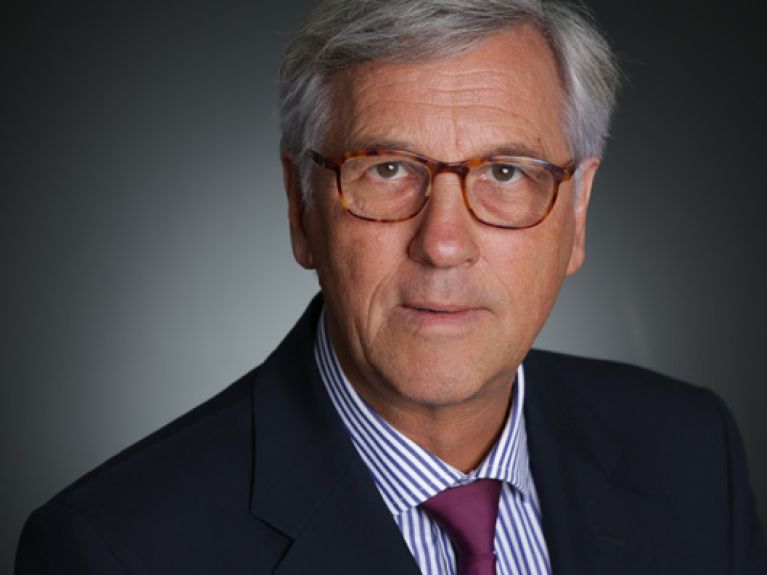Ambassador Dr Michael Witter in Singapore
In the deutschland.de series “Foreign posting” German ambassadors let us peek behind the diplomatic scenes and talk about their host country. Part 9: Dr. Michael Witter in Singapore.

Dr. Witter, what topics are currently defining bilateral relations between Germany and your guest country?
2015 not only marks 50 years of independence for Singapore but also the 50th anniversary of bilateral diplomatic relations. We will conduct a series of events to mark the occasion. One result of Prime Minister Lee’s visit to Germany in early February is that we wish to intensify collaboration on practical professional training. Specifically, we are working on a pilot project in which German firms in Singapore and the Singapore Institute of Technology are offering a Bachelor qualification, which includes about nine months of practical work under expert supervision. Prominent topics in the political dialogue are the negotiations for a new global climate treaty in Paris and the change to renewable energy in Germany. We are also canvassing Singapore for a stronger role of the EU in the region.
Where are ties between your host country and Germany especially strong, and where would you like to deepen relations?
Singapore is the nation in Asia with the highest pro-capita income, which like few other countries has exploited globalization by opening up economically, creating reliable framework conditions and placing a strategic accent on technology. So for us the economy, investments, scientific cooperation and naturally culture are the “evergreens” and form the backbone of our relations. The number of German firms that use Singapore as a regional hub – currently there are 1,400 – is on the rise. In this context, the embassy works closely with the Singaporean-German Chamber of Industry and Commerce and the German Centre; our contact with the government is also good. The presence for so many years of the largest German school in Asia is a further factor favouring Singapore as a business location. Our scientific cooperation includes not only Munich Technical University, but also the Fraunhofer Institute. That must be maintained and can be expanded. Every year the political dialogue is conducted at state secretary level and hugely benefits both sides. In the area of security policy the Shangri-La Dialog has meanwhile developed into the “Asia Security Summit”. Especially exciting topics at the moment are questions of regional security and Singapore’s role as facilitator.
In 2015 Singapore celebrates 50 years of independence and 50 years of bilateral relations with Germany. What highlights are planned?
We are using these anniversaries to present to a broad audience the density of relations and Germany’s involvement in developing Singapore, for example through investments made by German firms. Not only will there be a photo exhibition in a prominent location, but also a picnic in Singapore Botanic Gardens to which German residents, and there are up to 8,000, and their Singaporean friends are invited. The Foreign Ministry is planning its own photo exhibition on Singapore’s foreign policy, in which we will be included with our own contribution as one of the 13 countries that immediately after independence, which was in 1965, took up diplomatic relations with Singapore.
The ASEAN Economic Community (AEC) is also scheduled for 2015. What will it change? And what economic role will Singapore play for Germany in future?
I regard the AEC more as a process. Within ASEAN I see a number of special national interests. But essentially the move is a positive one, and we must not forget that the forming of ASEAN was primarily motivated by security policy considerations. As such, much has already been achieved economically. Singapore is also well positioned for the next 50 years and will continue its success story – even though it will face continuing pressure to adapt. As regards its ageing population, skills shortage and the cost of medical care, for example, Singapore faces the same problems as Germany. That said, for the time being I do not see a realistic scenario in which the largest economies of ASEAN will quickly catch up with Singapore as regards infrastructure, legal certainty and freedom from corruption causing large numbers of international firms to abandon their hub in Singapore.
Often countries are seen differently from the inside than the outside. What else needs to be said about Singapore based on your personal experiences?
Singapore continues to be a city state based on rules with strict laws and extreme punishments. As part of our intensive exchange with Singapore we are doing what we can to achieve the abolition of the death sentence and corporal punishment. But Singapore is ruled more openly today than several years ago. The new generation and the very high prevalence of social media will effect a further, gradual relaxation.

